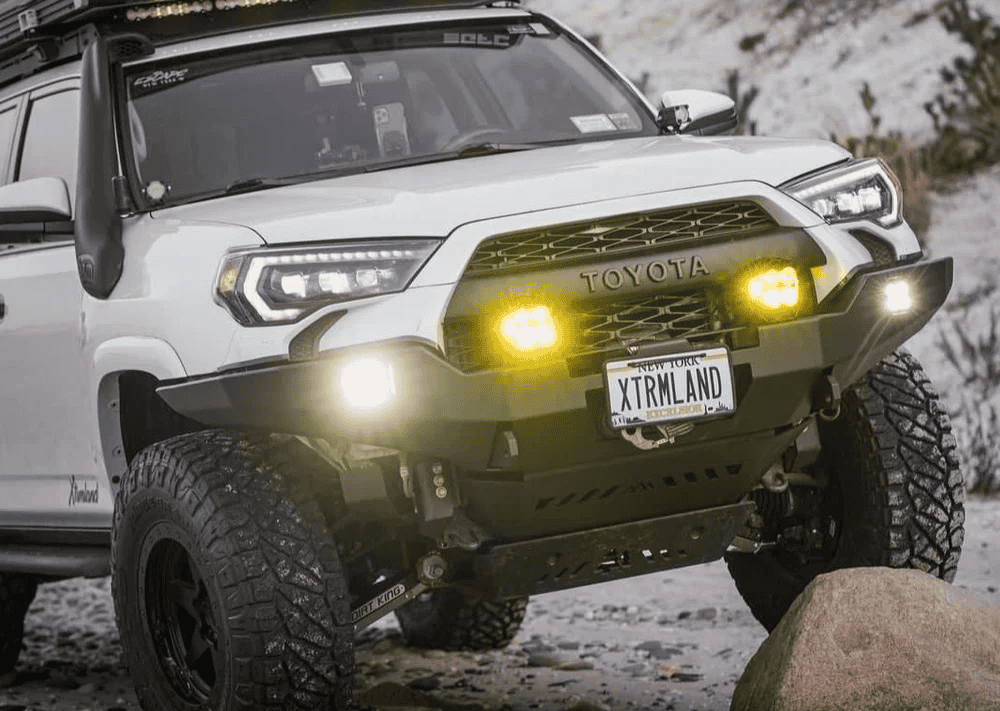Overland Vehicles

Mountain travel exposes a truck to steep grades, variable traction, and thin air. Before buying parts, define the trails you actually plan to drive and how much weight you truly carry. A focused mountain trail 4x4 build aims for dependable climbing, predictable braking on descents, and controlled body motion across rock steps and off camber shelves.
Platform choice matters. Shorter wheelbases pivot through tight switchbacks but feel choppier. Longer wheelbases bridge ledges and ride smoother yet demand careful line choice to avoid belly strikes. Curb weight and payload capacity drive everything from spring rates to tire size. Add armor, tools, water, and recovery gear to your payload math early, not after parts are ordered.
Altitude raises the stakes. Engines make less power, transmissions generate more heat, and long grades test cooling and brakes. Plan airflow, transmission cooling, and pad and rotor choices with mountain descents in mind. If you tow, spec the cooling system and brakes for it. Stability and thermal margin beat flashy parts every time.
Suspension is the handwriting of your build. Aim for controlled articulation rather than sky high lift. Travel that keeps tires planted reduces wheelspin and protects the trail. Quality shocks with digressive or position sensitive valving tame chatter and prevent heat fade on washboard climbs. Springs should match real payload so the truck rides at its designed height and uses its travel evenly.
A modest lift paired with corrected geometry can increase clearance without upsetting steering feel. On solid axle rigs, track bar and caster settings define straight line stability. On independent front suspension, upper control arms and proper alignment regain droop and camber control. Sway bar strategy matters too. Quick disconnects or softer rates improve articulation at low speed, while retained bars hold the line on high mountain roads.
Tires win or lose days in the hills. All terrain patterns with strong sidewalls balance rock grip, snow performance, and noise. Mud terrain designs bite in loose rock but can skate on packed snow. Mid size rigs commonly run 33 to 35 inch tires; heavy duty platforms may justify larger sizes if gearing and brakes are addressed. Airing down increases the contact patch and softens impacts. Carry accurate gauges and a reliable compressor to return to on road pressures.
Lockers and limited slip units transform slow climbs. A selectable locker prevents diff bias when a tire unweights on a ledge. Crawl ratio ties it together. Short overall gearing allows the truck to idle over steps without riding the throttle, keeping traction smooth and driveline temps in check. Regear when tire size or payload significantly alters performance.
Armor should be strategic. Skid plates shield the oil pan, transmission, transfer case, and fuel tank. Rock sliders carry weight during a pivot and save doors from boulders. Front bumpers that accept a winch improve recovery options and approach angle, while rear bumpers protect departure and often add recovery points. Keep total weight reasonable to preserve suspension behavior and braking.
Recovery readiness is insurance. Pack a rated winch line, soft shackles, a tree saver, traction boards, and a shovel. In mountain terrain, a reliable engine driven or dual battery electrical system is equally important. It powers air compressors, lights, and communications without voltage dips. Isolated house power avoids draining the starter battery during camp or night recoveries.
Steep grades and thin air call for confident braking. Choose quality pads that maintain bite when hot and inspect rotors and fluid regularly. On long descents, favor lower gears and engine braking to manage speed rather than riding the pedal. Steering precision also matters. Tighten tie rods, ball joints, and bushings so the truck tracks true on narrow shelf roads.
Visibility is its own safety system. Aim fog and driving lights to reduce glare in mist and snow. A hood level light bar can reflect off dust; ditch lights and well aimed fogs often perform better in bad weather. Navigation and communication are non negotiable in the backcountry. Pair offline topo maps with satellite messaging or ham radio for when cell service vanishes. Always check weather windows and avalanche forecasts where applicable.
Trail etiquette keeps routes open. Stay on established lines, avoid spinning tires in mud bogs, and pack out waste. When traffic stacks at a switchback, communicate calmly and yield to uphill vehicles when safe. A small routine makes days smoother:
When the plan is clear and components are chosen to match real terrain, a mountain trail 4x4 build becomes predictable and enjoyable. That is the mark of a good setup.
If you want expert hands to turn that plan into a finished rig, our team builds mountain ready trucks and vans with balanced suspension, smart gearing, and reliable power systems. Explore our overland rigs, see how a custom overland upfit comes together, and learn more about why choose OZK Customs. We are based in Fayetteville Arkansas, central to mountain routes across the region, and we hand off every build trail ready. Share your goals and we will craft a platform that climbs with confidence and drives home with ease.
Ready to turn planning into a proven build? Our Fayetteville Arkansas team designs and delivers trail tested 4x4 upfits that climb, crawl, and drive home comfortably. Share your terrain, timeline, and payload needs and we will spec it, build it, and hand you the keys.
ADDRESS:
6159 E Huntsville Rd, Fayetteville, AR 72701
PHONE:
(479) 326-9200
EMAIL:
info@ozkvans.com